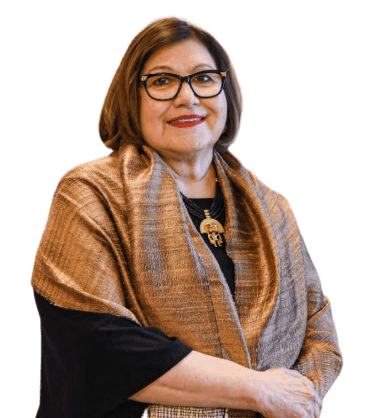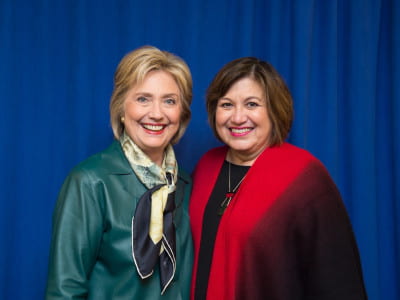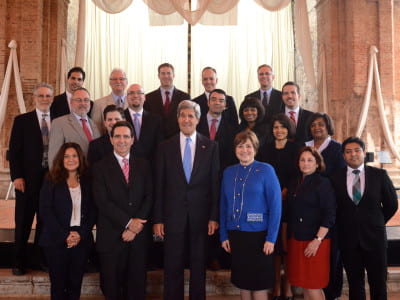Carmen Lomellin
By Marilyn Ferdinand, DePaul Magazine: Winter 2020
“Excitement about things became a habit, a part of my personality, and the expectation that I should enjoy new experiences often engendered the enjoyment itself,” wrote historian, journalist and political biographer Doris Kearns Goodwin.
It’s no wonder that Carmen Lomellin (MBA ’84) is an avid fan of Kearns Goodwin. The busy 60-something traveled far from her working-class roots in East Chicago, Ind., because, she says, “It was instilled in me the need to know more because I felt very curious.”
Just where has Lomellin’s curiosity taken her? All the way to the White House and beyond.
Lomellin, a second-generation American, grew up in a tight-knit family with origins in Monterrey, Mexico. Like most of the residents of East Chicago, almost the entire family earned their living in steel.
“At that time, the steel industry was huge,” Lomellin says. “My family, some of them are retired already. My brother retired from the mills. My dad retired from the mills. I had uncles who retired from the mills. I have a sister who still works for Arcelor Mittal Steel, which used to be Inland Steel. There’s still strong activity there.”
Naturally, Lomellin says, “When I got out of high school, it was expected that I work to help support my family. The first eight or nine years, I worked the night shift in the billing department at Inland. At the same time I was trying to put myself through college.”
Senior Advisor to President and CEO at Cell-Ed
Lomellin went to night school at St. Joseph’s College (now Calumet College of St. Joseph) in Whiting, Ind., and earned her bachelor’s degree in business management. At Inland, she transitioned into an administrative position in the sales department in an office located two blocks from DePaul.
“I wasn’t getting anywhere,” she remembers. “I had gotten my undergrad, and I was still sitting in basically a clerical position. I was really frustrated. I looked around, and everybody had an MBA. So I decided to get an MBA.” Lomellin paid her own way to another degree, attending evening classes at DePaul’s Loop Campus.
Lomellin thought that letting her employer know she was earning her MBA would change her prospects at Inland, but she remained stuck in her administrative position. “At that time, steel was primarily a white-male-dominated industry,” she says. “I just had to look for another job. I had been with the company since I was 18—14 years. It was one of the hardest decisions I had made to that point.”
“I feel that you can always figure anything out—unless it’s rocket science. You’ll figure it out, and I did.”
Luckily, Lomellin had gotten involved in community issues during her time at DePaul and was able to plug into a network to plan her next move. “I was told that the Chicago office of the Mexican American Legal Defense and Educational Fund, MALDEF, was looking for someone to run their leadership training program. I had never done that, ever! I was thinking, ‘Hey, what the heck. If worse comes to worst, I can always move back home.’”
That did not become necessary. Remembering back, Lomellin shares a bit of her work philosophy: “I feel that you can always figure anything out—unless it’s rocket science. You’ll figure it out, and I did. Plus, I had a good team to work with.”
In 1982, Lomellin joined MALDEF, and her work made a lifelong human rights advocate out of her. “At the time, MALDEF was doing a lot on immigration reform and focusing on what was happening in immigrant communities. I did a lot of voter registration,” she says. “In talking to people, I found out that they didn’t know what their rights are or what they’re entitled to.”
One incident made a lasting impression on Lomellin. “I remember talking to an older lady, she must have been in her 80s. I asked her if she knew if she was registered to vote. She said, ‘No.’ I said, ‘Are you a citizen?’ She said, ‘No.’ I said, ‘Where were you born?’ She said, ‘Texas.’ Wow.”
It became clear to Lomellin while working at MALDEF that it was time to take a deeper dive into politics. “I figured out you can scream and holler all you want, but if you’re not at the table when the negotiations are taking place and when the decisions are being made, it’s not going to happen,” she explains. “So that’s when I started to volunteer on campaigns.”

Her first concerted effort involved helping Illinois Democrat Paul Simon win his race for the U.S. Senate against Republican Senate incumbent Charles Percy in 1984. “I was just a little person in the group, answering phones and sending out mailers,” Lomellin remembers. She later joined his unsuccessful bid for the U.S. presidency in 1987–88.
She also began working on economic development issues for Chicago United, a nonprofit focused on developing multiracial leadership in business. “It’s a fascinating organization that fosters collaboration between the private sector and community leaders to better Chicago’s social and economic climate,” she says. Her experience at Chicago United made her a good fit for newly elected Mayor Richard M. Daley’s Office of Employment and Training as director of the Private Industry Council of Chicago, which she joined in 1989.
Her duties in the mayor’s office took a surprising turn. “If you recall, Mayor Daley was a clean freak,” Lomellin laughs. “He was always very focused on the cleanliness of the city, and the graffiti used to drive him nuts. So I had this job of coordinating the graffiti removal efforts, which was a city service. So you had to go out to different wards and talk about what the mayor was doing and how this program worked.”

Lomellin recalls that the program “was really pretty successful. It was not necessarily the safest job I’ve ever had. My family thought I was nuts, but I learned a lot, and I met a lot of wonderful people. It was a very positive experience in the long run.”
In 1991, Lomellin got a call from a friend who used to work for the chairman of the Illinois Democratic Party: “‘Governor Clinton and his wife are coming to town. Would you be interested in … could you take her around? She wants to meet with some of the Hispanic leadership.’ And I did, and that’s how I met Hillary.”
The two women got along well, and Lomellin became very active in Bill Clinton’s first presidential campaign. She traveled with Mrs. Clinton on the campaign trail and discovered that “she’s one of the smartest human beings I’ve ever met. I did a trip with her to Arizona, and she was speaking to a chamber of commerce on Bill Clinton’s economic policy. I was blown away. She did it completely without notes.” And in a personal aside, Lomellin says, “She has a wicked, wonderful sense of humor. She really does.”
When Clinton won the election, Lomellin was asked to join his administration. She was placed in charge of the Office of International Affairs in the U.S. Office of Personnel Management (OPM), where, she says, “we provided technical assistance and briefed other countries on our civil service system.” She also was the White House liaison for the OPM and an advisor on Hispanic affairs to the White House Office for Women’s Initiatives and Outreach. She continued her work in personnel management during President Clinton’s second term in office.
“And then, of course, those jobs come to an end,” Lomellin says. She left the Clinton Administration in 1998 to begin work as the executive secretary of the Inter-American Commission of Women for the Organization of American States (OAS), an umbrella multilateral organization with 35 member nations from across the Americas that is structured and functions like the United Nations.
“I’ve met some of the most interesting people in the world. I’ve been around heads of state. I’ve been around human rights activists. I’ve been very blessed.”
“The Inter-American Commission of Women is actually one of the oldest organizations in the hemisphere. It has been around since 1928,” Lomellin says, noting that it predates the founding of the OAS in 1948. “The commission focuses primarily on women’s human rights. Gender is a cross-cutting issue. You get to focus on women in labor, women in education, women in health. Pick an issue. There’s always a gender perspective to be had.”
During her tenure, she received an interesting proposition that led her back to DePaul. “I was approached by someone who worked for M. Cherif Bassiouni.” The late Dr. Bassiouni, then a professor in the College of Law, founded the International Human Rights Law Institute (IHRLI) at DePaul and, famously, helped create the International Criminal Court at The Hague. “The young man said, ‘The OAS should think about doing something with trafficking.’” The result was the 2002 publication “In Modern Bondage: Sex Trafficking in the Americas,” the results of collaborative research between the IHRLI and the OAS’s women’s commission and its Inter-American Children’s Institute.
“We were talking about trafficking issues and the misconception that it’s only a problem in Asia,” Lomellin says. “When speaking with nongovernmental organizations, we learned that it happens globally. We started doing research and getting data. At first people pooh-poohed it, saying, ‘You’re wasting time and money.’”
In addition, she says, “People think that trafficking is only an international issue. No, it’s not. It happens in plain sight. It’s moving a young person from one place to another. From one city to another. From rural to urban. It happens all the time.”
Through the persistent efforts of Lomellin and her team, trafficking was put on the OAS agenda as a priority issue that is worked on year-round. “That’s something I’m very proud of. I had a terrific team when I was doing all the research and talking to the people themselves who had been trafficked—all thanks to DePaul University, which literally opened up the door.”

When President Barack Obama began building his administration in 2009, Lomellin was his logical choice to become the U.S. ambassador and permanent representative to the OAS, a position she held for five years of his presidency. With her years of experience at the OAS, she was well positioned to address issues of common interest to the nations of the Americas while continuing to fight for gender equality.
“There’s an interesting case in Nicaragua I encountered when I was working on a small project on gender-based budgeting,” she says. “[The field agents] decided to teach the residents of this small town what a budget is, how it works and how you can have a say in the budget. They separated the men from the women.

